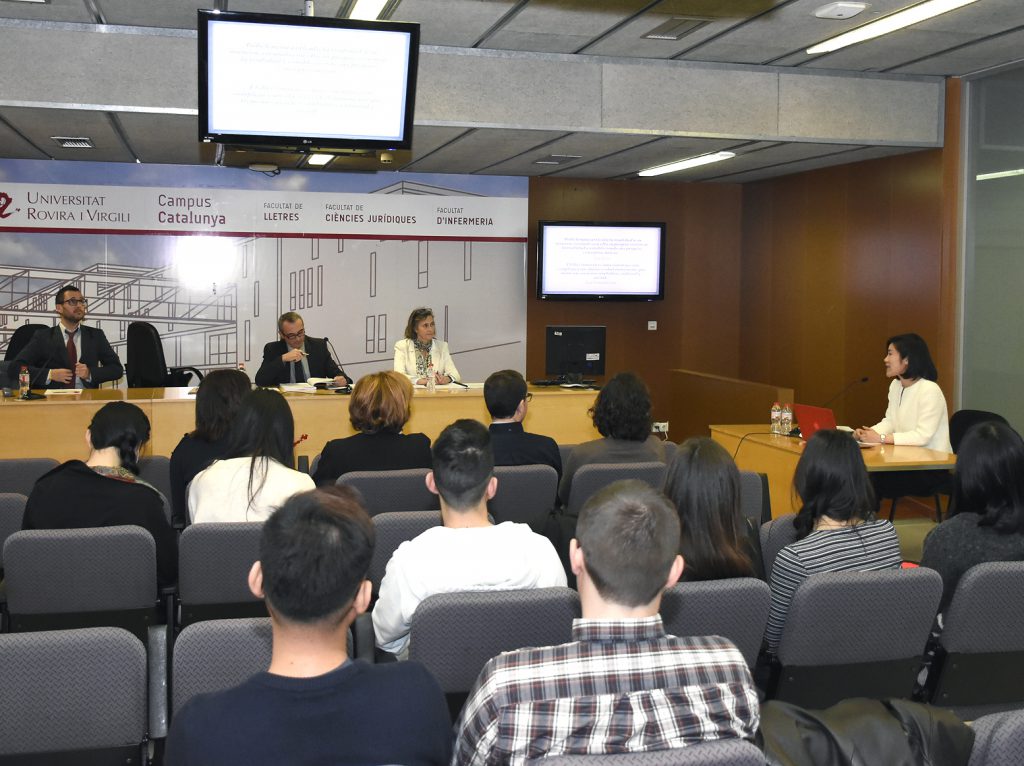13/03/2017
First doctorate for a former student of the programme for Chinese students
On Friday 10 March Yun Luan defended her doctoral thesis on a proposal for a Chinese-Spanish bilingual cultural dictionary

On Friday 10 March Yun Luan defended her doctoral thesis on a proposal for a Chinese-Spanish bilingual cultural dictionary
With a final grade of ‘Excellent’, Yun Luan became the first former student on the programme for Chinese students to be awarded a doctorate by the URV. Her thesis Propuesta de un diccionario cultural bilingüe chino-español (Proposal for a Chinese-Spanish bilingual cultural dictionary) was described as “daring and courageous” by the examination panel entrusted with evaluating the thesis and which finally awarded the highest possible grade. The project aims to lay the foundations for an on-line cultural dictionary for Chinese people who want to learn Spanish and for some months now has been funded by the Chinese government.
Yun Luan first arrived in Tarragona to take part in the Spanish programme for Chinese students that the URV has been running since 2005. Yun Luan studied the last two academic years of her degree in Tarragona as a student on this programme and, when she finished, she returned to China to work at the Zhejiang University of International Studies. There she taught Spanish and set up the institution’s Department of Spanish. In 2014 she decided to return to Tarragona to do her doctoral thesis in the framework of the doctoral programme in Humanistic Studies under the supervision of Esther Forgas, director of the URV’s Centre for Hispanic Studies. Currently there are a dozen Chinese teachers of Spanish who are studying for a doctorate at the University.

Improving the shortcomings of bilingual dictionaries
Yun Luan has spent three years analysing the most popular Spanish-Chinese-Spanish dictionaries. In this time she has detected such weak points as the fact that they do not contain enough cultural entries and they do not point out linguistic taboos or euphemisms when describing the meaning and use of words. She also found that there was a lack of illustrations to help understand better terms that are difficult to explain such as colours, biological species, musical instruments, gastronomy and folklore.
In this context, she selected 20 cultural words in Spanish from different fields, and checked how they were defined in these dictionaries. Then she administered a questionnaire to some Spanish Chinese students and assessed the consequences of the lack of cultural information in the definition of the terms in the dictionary.
The results of the questionnaire showed that many definitions do not coincide with the definitions given by native Spanish teachers in class. For example, 65% of the students surveyed thought that castillos humanos were built to protect something. The survey also detected that students do not dare to question the definitions given by dictionaries, even though they often find them to be inadequate. And since they do not have a good understanding of Spanish customs and traditions, even though they understand the lexical meaning of words they respond to the survey from the perspective of Chinese culture, which can give rise to mistaken interpretations.
The survey also showed that the words that express the lifestyle and the social identity of a community (like aperitivo, piscolabis or tapa) are the most difficult to explain briefly to speakers from culturally distant societies. On top of all this, most Chinese students merely obtain the lexical equivalent from dictionaries, without reading the information that adds nuances.
Proposal for a digital dictionary
With these results, Yun Luan suggests creating a new type of digital bilingual Chinese-Spanish dictionary that takes into account the idiosyncrasy of the two languages, incorporates the cultural component and extends the definitions with sociocultural information about these words and with audiovisual supplements whenever necessary.
According to Yun Luan, the advantage of this online dictionary is that it makes it possible to add a network of hyperlinks that connect an initial entry with other words connected to the concept. The dictionary also makes it possible to constantly renew the definitions, in parallel to the progress of society and the changes that come about.
Programme for Chinese students
This is the first doctoral thesis produced by a former student of the URV’s programme for Chinese students, which started in 2015 and is a great success in terms of student numbers. For its originality and pedagogical approach, the programme was awarded the Vicens Vives Prize for Teaching Excellence in 2011. After her time at the URV, the now doctor Yun Luan highlights the quality of the programme because “it responds to the students’ needs and the classes are very useful”.
